One of the youngest children on the Kindertransport, Paul Alexander leads a successful life; his only regret is that he never hit a six in cricket. Perhaps the true heroes in Paul Alexander’s extraordinary story are his parents who, in 1939, sent their 16-month-old only child on a Kindertransport from their Leipzig home to safe haven in England. Today he lives in Ra’anana with his Israeli wife, Nili, works as a lawyer and leads a satisfying and pleasant life.

Old Pupil John Karlick outside the Fulneck Moravian Church, Pudsey, Leeds
On boarding a packed train out of Nazi-occupied Prague in June 1939, nine-year-old John Karlik and his younger sister Vera didn’t realise they were waving goodbye to their father for the final time. The pair escaped after Moravian clergyman Bishop Shaw, who was on a visit to Prague, arranged for them to catch what turned out to be the last train out of the city and offered them refuge at his home in Fulneck, Pudsey.
Hamden Hall Country Day School’s community lecture series features a documentary that tells the inspirational story of the Czech Kindertransport that rescued 669 children in the early days of Nazi occupation. Nicky’s Family will screen in Hamden Hall’s Taylor Performing Arts Center Tuesday, Oct. 22, 6:30 p.m. Following the screening, Mr. Ivan Backer will discuss his personal experience on the Kindertransport. Mr. Backer’s mother put him on a train in Prague bound for London in May 1939.
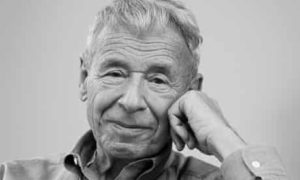
‘If you look at anyone’s life, it’s pretty crazy. That you don’t end up on the rocks somewhere is just a miracle’ … director Michael Roemer. Photograph: Harold Shapiro.
He fled the Nazis for a British boarding school – then made a shocking drama about segregation in the deep south. Michael Roemer talks fate, family and sadistic governesses In the last 10 days, I have seen three films by Roemer: two documentaries and Nothing But a Man, his first feature, shot in 1963…if I could reach out and grab your collar I would: do whatever you can to see these films.
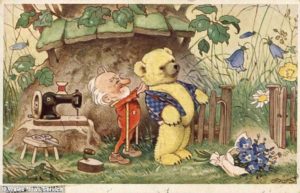
Mr Foner has always kept the postcards sent by his father after he was sent to Wales as a child
A grandfather has revealed the heartbreaking postcards his father sent him from Nazi Germany before he died in Auschwitz. Henry Foner, 81, was just six when his parents sent him to Britain to escape the growing persecution of Jews in 1938. His father Max sent him dozens of brightly coloured postcards filled with fatherly love that Mr Foner has treasured for the last 75 years. Mr Foner has published the moving correspondence in a book titled Postcards to a Little Boy.
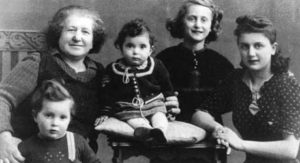
Sig, bottom left, and Zilla Koppold were very young when they arrived in England. Dana Binke, left, was their guarantor, at left cousins Edith and Paula, also on the Kindertransport
You live in Leipzig. It is 1939. The world is imploding. It is exploding. Nothing is safe. Nothing makes sense. Because of your family connections, you have a chance to save your children. It would mean putting them on a train — yes, all of them, even the baby — and sending them far away. You will not be able to protect them once they arrive, and you might never see them again. You have very little time to make the decision. What do you do?
Nicky’s Family, out July 19, shows how the “British Schindler” saved hundreds of children from Hitler’s forces, including Masters’ own mom. My grandmother’s name was Sidonia, and she lived with my grandfather Salamon in the remote mountain village of Trstena, then part of Czechoslovakia (now Slovakia). They had three little girls, among them my mother, Alice. For most of my mother’s childhood, they lived in a couple of rooms in a house with no electricity or running water.
Nicholas Winton is someone whose life is a worthy subject. He was an English Holocaust rescuer who was the primary moving force behind the Kindertransport program that rescued Czech Jewish children from the Nazis. Unfortunately, each of Minac’s three films on Winton is preachy, bathetic and clumsily manipulative. Nicky’s Family, the latest film is certainly the best of the three, but that is a relative judgment.
On the 75th anniversary, the Prince of Wales hosted a reception in honor of a few hundred aging Kindertransport participants.The prince spent two hours at the event, which was sponsored by the Association of Jewish Refugees. Prince Charles “was charming. He seems interested in everybody, and I was very impressed,” Joe Garten of Roslyn, L.I., who attended the reception with his fellow-refugee wife, Bea, told the Jewish Chronicle.
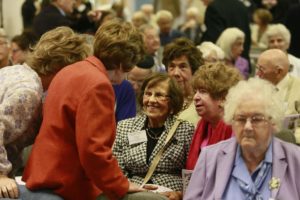
Hundreds gather for Kindertransport reunion
A generation of young Jewish refugees who escaped Nazi occupied Europe as children met again for the 75th reunion of the movement that helped them escape. More than 400 who took part in the Kindertransport met at the Jewish Free School, in The Mall, Kenton, on Sunday June 23 for the reunion.

Kindertransportees Ann and Bob Kirk meet HRH The Prince of Wales
More than 400 now elderly people started new lives in Britain after they were sent from countries including Germany, Austria and Czechoslovakia in the Kindertransport. They gathered at the Jewish Free School, in the Mall, Kenton on Sunday for a reunion, and survivors and their families attended a lunchtime reception hosted by HRH The Prince of Wales on Monday.

Alfred and Miriam Buechler
Alfred Buechler, 87, and wife Miriam, 78, were guests of Prince Charles on Monday to remember the Kindertransport – a rescue mission that brought around 10,000 children here between 1938 and 1939. Alfred was one of the Kinder, as the rescued children refer to themselves, while Miriam survived two Nazi camps with the rest of her family.
MEMORIES of fleeing pre-war Nazi Germany have come flooding back to a Gower pensioner following a royal invitation to visit London. Ellen Davis arrived in Swansea in 1939 as one of 10,000 Jewish children sent abroad to escape Nazi atrocities. The rest of her family, including her brother and sisters, were sent to a concentration camp in Latvia where they were shot and killed.

Bernd Koschland, transported from Bavaria, aged 8
Ten thousand children were evacuated by parents desperate to get them to safety. Acts of commemoration are taking place this week, but as survivors grow old, how should their stories be remembered? BBC Newsnight hears the stories of four of them.

Reporter Susan Bookbinder with 2g’s Barbara Dresner and Thomas Bonin
Learn, Learn, Learn – they can take everything from you except what’s in your brain. A mother’s last words to her teenage daughter at Leipzig Central Station in August 1939. Feige Mendzigursky wore a name tag stamped with swastikas around her neck – the pass was virtually all she had – but it was to save her life.
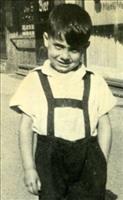
Young Leo Metzstein
Leo Metzstein, 81, was one of 10,000 Jewish children living in Germany who were allowed out the country by Nazi dictator Adolf Hitler before the outbreak of World War II in 1939.
One of the most interesting things about the coverage of Margaret Thatcher’s death was the revelation that her father, Alderman Roberts of Grantham, took in a Jewish refugee girl and gave her a new life. The story was similar to that of the Attenboroughs – the parents of Richard and David – who provided a home for two German Jewish girls who arrived here on the Kindertransport.
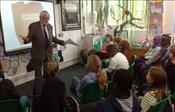
Rabbi Bernd Koschland speaking with schoolchildren
Year 6 welcomed several very special guests on Thursday afternoon. Not only did Rabbi Bernd Koschland come to tell the children all about his experiences of the Kindertransport, he brought along with him the Newsnight film crew! Rabbi Bernd’s story is remarkable. Born in a small town near Nuremburg in Germany, he witnessed first hand world changing events.
The candles were lit for the Jewish festival of Hanukkah as 10-year-old Ruth Heber and her seven-year-old brother Harry left their family’s rented rooms in Vienna for the last time, almost 75 years ago. “Our father blessed us and we went to the station,” she remembers. “It was in the evening so the public would not know what was going on. My parents were not allowed on the platform. They said: ‘Be a good girl and we will be writing and thinking of you and we will be coming very soon.’”

Eva Schaal left Berlin during the Holocaust on the Kindertransport, a rescue mission to get Jewish children out of Nazi Germany, Austria, Czechoslovakia, Poland and the Free City of Danzig.
Eva Schaal remembers the night Adolf Hitler came to power. She was 11 years old, and was performing on stage when she heard an announcement over the city’s loudspeakers: Hitler had been appointed chancellor of Germany. That night, Schaal saw swastikas all over the streets of Berlin. She vividly remembers seeing soldiers marching in celebration.